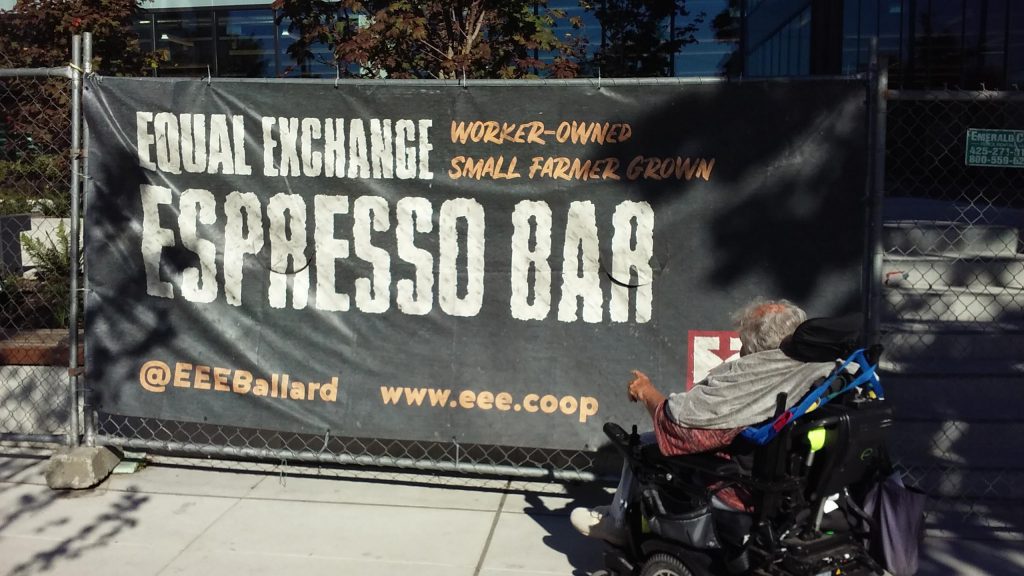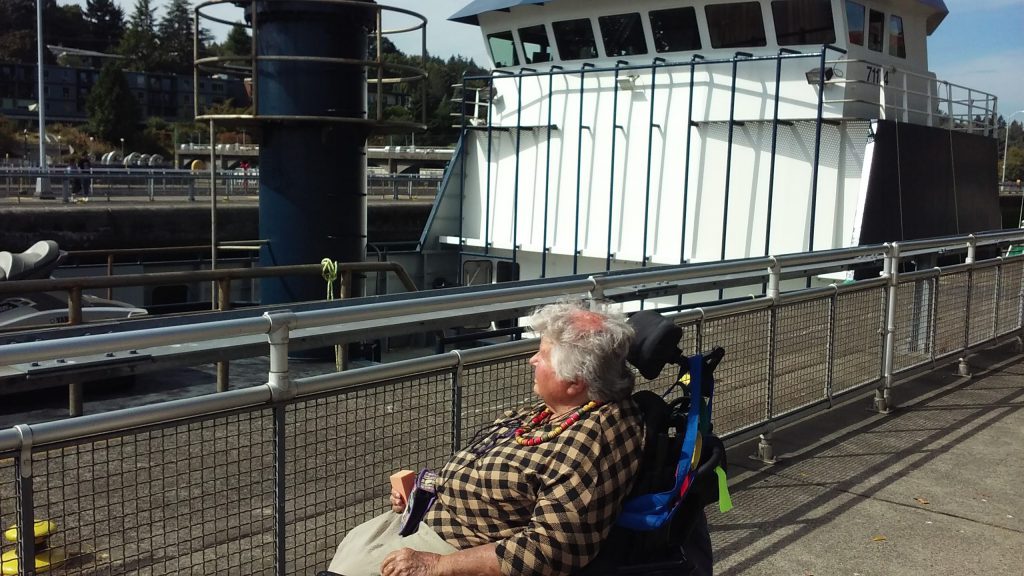I thought Charlie and I had found our neighborhood coffee-house, a part of settling in. We tried the latte at five places. We sat inside and outside and checked for noise, proximity, and wheelchair-amenable spaces, tables, and entryways.. We found the Bauhaus, and I put a Bauhaus decal on my mug., though I first thought “Bauhaus” was a dog-grooming business. And yes, I know Bauhaus is a German art school, but a pet care place is just a corner further down the street. So the mistake was natural, practically expected. Then Charlie saw the sign.

Action Shot #9. Pointing. Note the absence of “Short Person Approved” from the list of pluses of a coming Equal Exchange coffee place, linked to, among others, Charlie’s almost- cousins, Todd and, by marriage, Beth Ann, from the SE Minneapolis neighborhood, now at Equal Exchange.
Equal Exchange is only a few blocks further than Bauhaus and kitty-corner from the drugstore. Lattes will be good both places. So do we choose old neighborhood loyalty or new home proximity — in the rain? I know for sure I will have to put a second decal on my mug.
…………………………………………………………………..
The early bird gets the worm, unless the worm has wiggled on. Go worm.
………………………………………………………………
Is a pertinent book of interest better read before or after a trip? Should it provoke anticipation or ease withdrawal?
Marianne read Barry Unsworth’s The Ruby in Her Navel, set in the 12thC. in Palermo. She liked it a lot so she included time in Sicily, which she also liked a lot, on her recent trip to the Mediterranean. Maybe good, pertinent historical novels before travel help focus on and compare places, cultures and, significant events then and now. So if a good historical novel builds excitement and awareness, what would be an equally good withdrawal read? I’m at a loss. Suggestions?
Barry Unsworth, called “a literary time traveler” in the NYT, writes great anticipation reads. He also writes a good withdrawal read. I liked his Land of Marvels which I chose after I took and loved a course in Sumerian, the language of ancient Iraq. Set in 1914 Iraq, this Unsworth book also contrasted then and closer-to- now, and demonstrated that access to and control of water, then oil, were, and still are, the stuff of dreams, plans, and war.
Anticipation reads are tricky, fun, and personal. For example, murder mysteries set in a place you are about to visit are better than travel guides, if you think the author’s knowledge and opinions are worthwhile. John Lanchester’s A Debt to Pleasure about food in France, among other things, comes to mind.
When in Tenants Harbor, which I love, I recommended Robert McCloskey’s One Morning in Maine as an anticipation read for those thinking about visiting Maine. If they thought nothing happened in the book, I suggested, they might enjoy more visiting someplace else. Nearly 30 years ago, I spent a five month sabbatical in Seattle.
Maybe my favorite example is Charlie, who lived in Seattle thirty years ago, as he does now, sending me, as an anticipation read, Timothy Egan’s The Good Rain: Across Time and Terrain in the Pacific Northwest. It was perfect then for my sabbatical year and now, as I am again in Seattle.

Action Shot #10. Thinking. See the VERY BIG fishing boat going through the narrow, complicated Locks into Puget Sound, then into Juan de Fuca Strait, and finally into the ocean. I’m not in Tenants Harbor anymore, but I’m still keeping an eye on the boats and loving being near the water.
……………………………………………………………………..
Some people follow the money. I follow information. So I enjoyed reading in the NYT that a 2019 MacArthur fellowship was awarded to “[t]he historian Kelly Lytle Hernandez, who has drawn on suppressed or scattered records to write histories of the United States Border Patrol and the Los Angeles County prison system.” NYT, 9/25/2019 I hope she writes of the strategies, surprises, and quandaries of her search. Public records can be a gold mine. Remember Roy Moxham’s The Great Hedge of India about the 2500 mile living hedge the Brits built to control the salt trade? As an archivist, he mined the extensive files of maps, etc. from the British in India. Maybe unintentionally, the nastiness and folly of walls comes through, too.

Grateful to have been introduced to Timothy Eagan’s writing through The Good Rain, and also to The Great Hedge—both on location at Roseledge.
Thanks for the good reading suggestions. Some library schools ought to hire you as a “visiting lecturer.” I wrote you today at your colleen@rose etc today.
Marcia